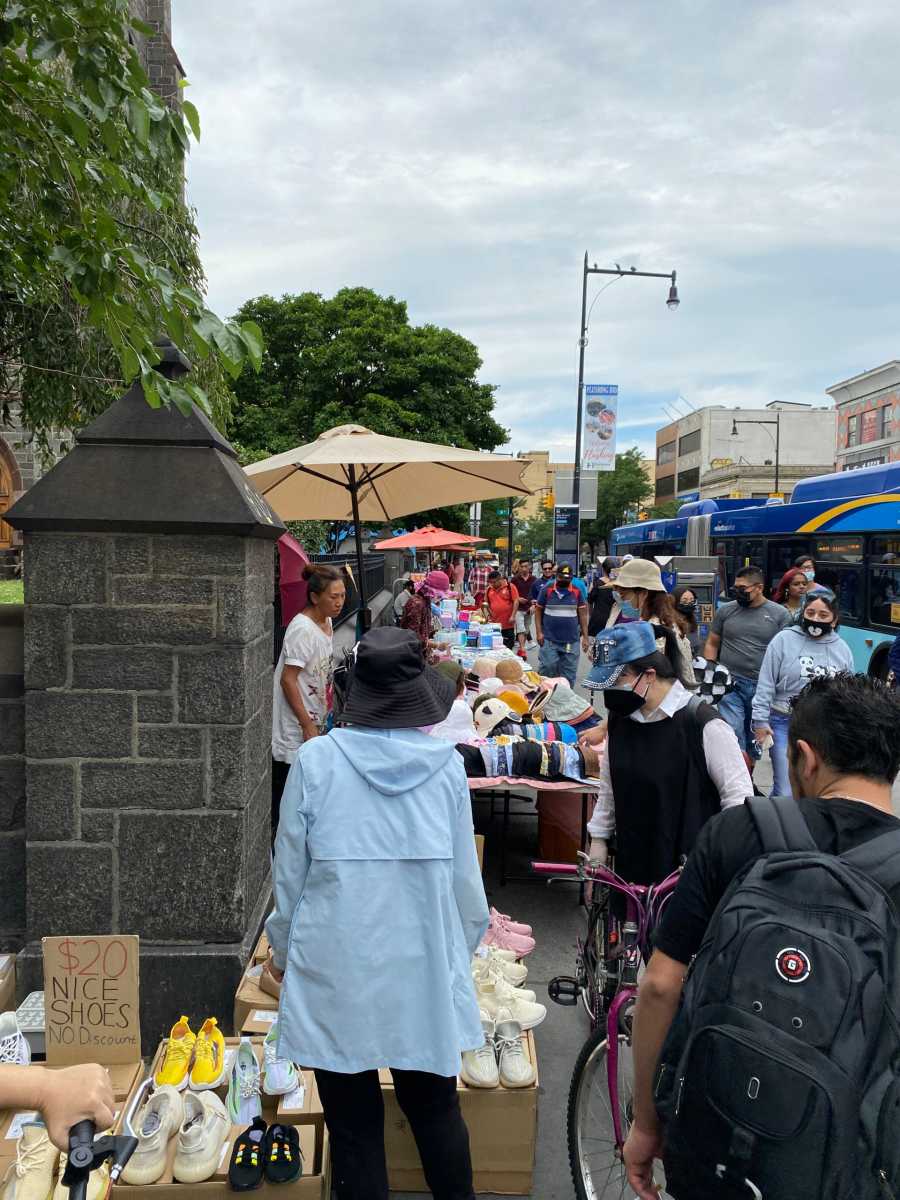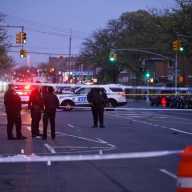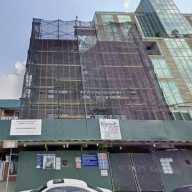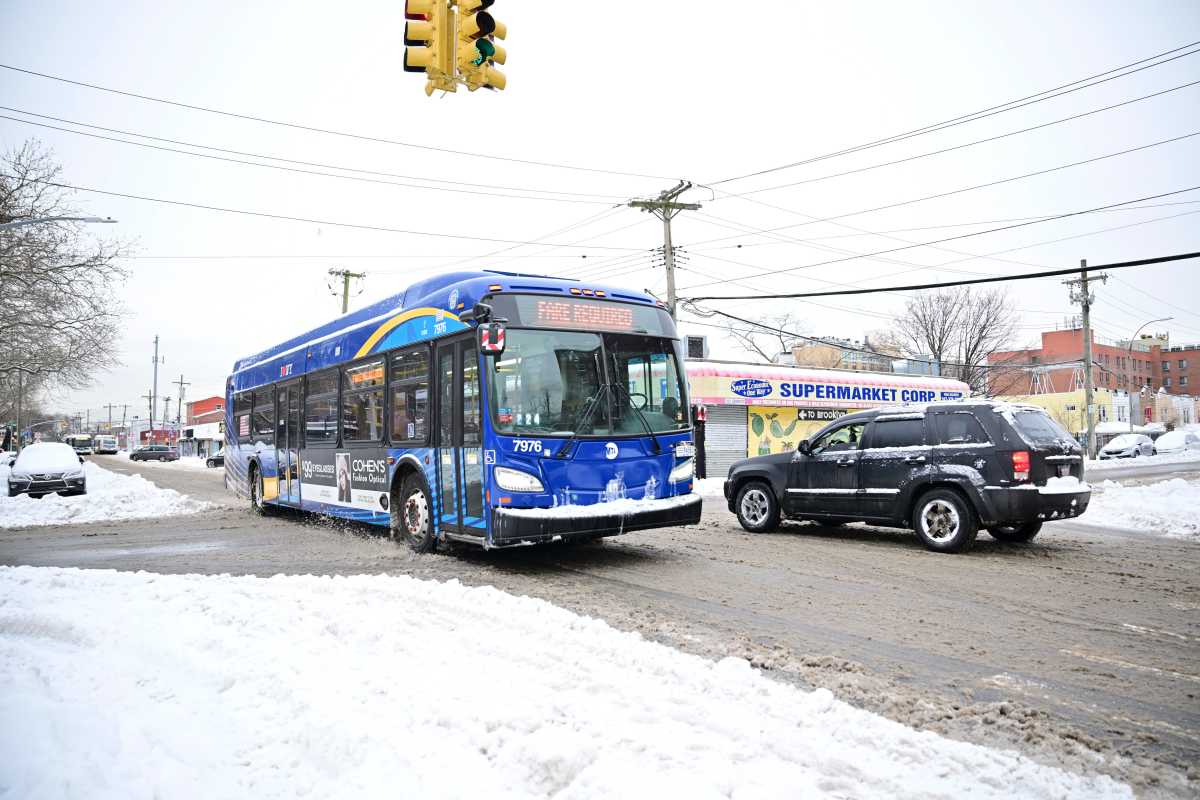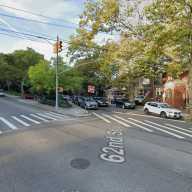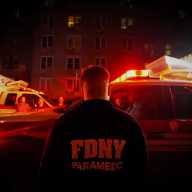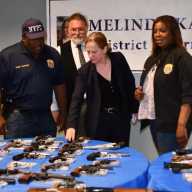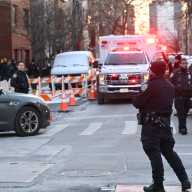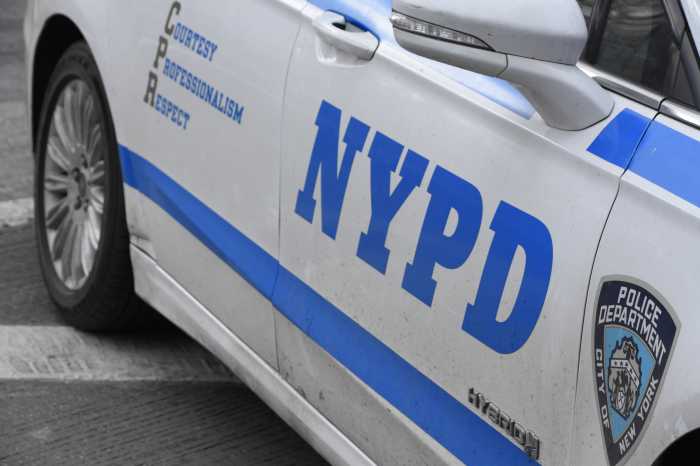Councilwoman Sandra Ung is once again urging the city to address the proliferation of unlicensed street vendors that have created a public health and safety issue in the heart of downtown Flushing.
According to Ung, the street vendors have created congestion and clogged sidewalks for residents, shoppers and tens of thousands of commuters who pass through the busy transit hub daily.
“While I appreciate and sympathize with the need for vendors to make a living and support themselves and their families, sidewalk congestion is a serious safety and quality-of-life concern in the downtown Flushing area,” Ung said. “However, we must keep our streets navigable and safe for all, and the sheer number of unlicensed vendors has become a public safety issue.”
Local Law 18 of 2021 created the Office of Street Vendor Enforcement within the Department of Consumer and Worker Protection (DCWP). In April, Ung invited DCWP Commissioner Vilda Vera Mayuga on a walking tour of Main Street to discuss the issue and possible solutions.
In May, Ung sent a letter to Mayuga asking her to direct DCWP to undertake a more robust enforcement strategy. Since then, DCWP enforcement agents have visited Flushing numerous times, but have focused primarily on educational outreach and voluntary compliance from the vendors as opposed to a punitive approach.
Ung said she is thankful to Mayuga and DCWP for allocating additional resources and manpower to address the issue, but it’s clear that the current approach is not solving the problem.
“That is why I am asking DCWP to adopt a strategy that proactively deters unlicensed vending on our streets. The goal here is not to be punitive, but rather to ensure that our sidewalks are clear and safe for the people who call Flushing home,” Ung said.
In a statement to QNS, a DCWP spokesperson said despite all of their efforts to encourage compliance in the area, some vendors have repeatedly refused to comply so DCWP needed to escalate its enforcement efforts to ensure compliance and best balance the needs of the community.
“Vending is a complicated issue that touches all of us — from the vendors themselves to local businesses to residents and visitors. Flushing in particular is a vibrant and bustling area where there is a lot of competition for the sidewalk, and unfortunately, an area where we have seen significant and repeated noncompliance,” a DCWP spokesperson said.
According to DCWP, they are committed to an education first approach to vending that includes the opportunity to comply before issuing violations. If needed in problematic areas and in response to complaints and repeated concern from local elected official and community leaders, DCWP turns to stronger and scaled strategic enforcement tactics.
DCWP has conducted more than 13,500 inspections since June 1. More than 1,100 of these inspections were in Flushing, according to DCWP.
DCWP has issued nearly 1,560 summonses since June 1. Nearly 100 of these summonses were in Flushing. As part of DCWP’s enforcement, 720 vendors in Flushing have been instructed to correct violations and the majority of vendors (695) either stopped vending or made the necessary corrections to avoid a summons.
Today’s enforcement action focused on those vendors who have a history of unlicensed vending and other violations, as well as refusal to comply with DCWP’s inspectors educational efforts. Both vendors, who are unlicensed and have been violating the law in numerous ways when DCWP visited Flushing, were asked multiple times to correct their violations in recent months, according to DCWP. After repeatedly violating the law and refusing to comply with DCWP’s efforts to bring them into compliance with the law, DCWP was forced to work with NYPD to confiscate the goods that they were selling.
The vendors can retrieve their goods from NYPD 109th Precinct. DCWP said they are the lead enforcement agency, but has partnered and will continue working with the NYPD as needed with uncooperative and repeat offenders.
Since taking office at the beginning of the year, Ung’s office has received numerous complaints from constituents, commuters and visitors, and the local business community about the growing number of unlicensed vendors lining the neighborhood’s sidewalks.
Peter Tu, senior adviser for the Flushing Chinese Business Association, said that the association supports Ung’s efforts to increase enforcement and make the streets safer and less congested.
“Since being founded in 1982, the FCBA has worked tirelessly to foster small businesses in Flushing while promoting and supporting entrepreneurship in the immigrant community,” Tu said. “Unfortunately, the explosion in street vendors on Main Street has had a dramatic and negative impact on this burgeoning commercial area — generating large amounts of garbage, creating extreme congestion on our sidewalks and making it difficult for law-abiding small businesses to compete with unlicensed vendors who do not follow health and safety regulations or pay taxes.”
Shirley Gilbert, a Kissena Boulevard resident, said the proliferation of street vendors in the area has made it incredibly difficult for local residents to get around, especially seniors who may use walkers or wheelchairs.
“The vendors not only clog the sidewalks, but they often block the bus stops for the Q17 and Q27. Because of issues like this, I started avoiding going to Main Street and Roosevelt Avenue,” Gilbert said.
Community Board 7 Chair Eugene Kelty said the board has had concerns for years regarding the amount of illegal vending that is being done in the downtown Flushing area.
“In the past, we have worked with the council member’s office and other city agencies to perform educational outreach to the vendors and help them understand the legal process,” Kelty said. “Unfortunately, their operations continue to impact local businesses who pay taxes, salaries and rent, and do not have the same advantages as unlicensed vendors. The board applauds the efforts of the councilwoman’s office in addressing this vending problem in the Flushing area and supports her efforts to ensure our streets and sidewalks are free of congestion.”

